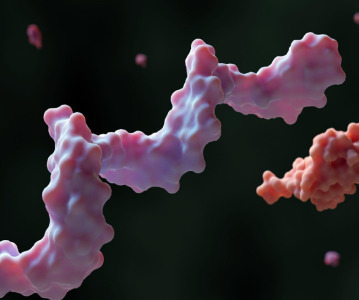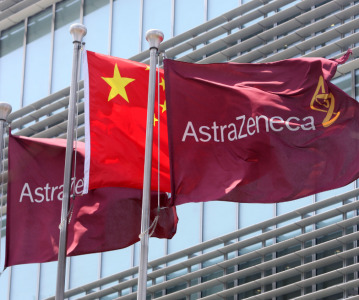Drug resistance biomarker could improve cancer treatment
A key gene that determines resistance to a range of cancer drugs has been reported in a study published by Cell Press November 21st in the journal Cell.
Cancer therapies often have short-lived benefits due to the emergence of genetic mutations that cause drug resistance. A key gene that determines resistance to a range of cancer drugs has been reported in a study published by Cell Press November 21st in the journal Cell. The study reveals a biomarker that can predict responses to cancer drugs and offers a strategy to treat drug-resistant tumors based on their genetic signature.
"We need to understand the mechanisms of drug resistance to effectively prevent it from occurring in the first place," says senior study author René Bernards of the Netherlands Cancer Institute. "We have identified a mechanism of drug resistance that is caused by the activation of a specific signaling pathway in cancer cells."
Non-small cell lung cancer (NSCLC) is the most common type of lung cancer, and NSCLC patients with a specific type of tumor mutation can be treated with a targeted therapy called crizotinib. But these patients frequently develop drug resistance as a result of secondary mutations in their tumors, through unknown genetic mechanisms.
To gain insight into this question, Bernards and his team developed a screen to identify genes whose suppression confers resistance to crizotinib in NSCLC cells. They discovered that inhibition of MED12, a gene that is mutated in cancers, resulted in resistance to not only crizotinib, but also other targeted drugs and chemotherapy used to treat various types of cancer.
The researchers also found that MED12 suppression caused drug resistance by enhancing signaling through the transforming growth factor beta receptor (TGF-betaR) - a protein involved in cell growth and cell death. By inhibiting TGF-betaR signaling in MED12-deficient cells, they were able to restore drug responsiveness. The results suggest that TGF-betaR inhibitors, which are currently being tested in clinical trials, may counter drug resistance in cancer patients with MED12 mutations.
"We have shown that blocking this escape route restores sensitivity to the original drug, suggesting a way to treat patients that have undergone this type of drug resistance." Bernards says.
Huang et al.: "MED12 controls the response to multiple cancer drugs through regulation of TGFbeta receptor signaling"
Related News
-
News Google-backed start-up raises US$600 million to support AI drug discovery and design
London-based Isomorphic Labs, an AI-driven drug design and development start-up backed by Google’s AI research lab DeepMind, has raised US$600 million in its first external funding round by Thrive Capital. The funding will provide further power t... -
News AstraZeneca to invest US$2.5 billion in Beijing R&D centre
Amid investigations of former AstraZeneca China head Leon Wang in 2024, AstraZeneca have outlined plans to establish its sixth global strategic R&D centre in China. Their aim is to further advance life sciences in China with major research and manufact... -
News Experimental drug for managing aortic valve stenosis shows promise
The new small molecule drug ataciguat is garnering attention for its potential to manage aortic valve stenosis, which may prevent the need for surgery and significantly improve patient experience. -
News How GLP-1 agonists are reshaping drug delivery innovations
GLP-1 agonist drug products like Ozempic, Wegovy, and Mounjaro have taken the healthcare industry by storm in recent years. Originally conceived as treatment for Type 2 diabetes, the weight-loss effects of these products have taken on unprecedented int... -
News A Day in the Life of a Start-Up Founder and CEO
At CPHI we work to support Start-Up companies in the pharmaceutical industry and recognise the expertise and innovative angles they bring to the field. Through our Start-Up Programme we have gotten to know some of these leaders, and in this Day in the ... -
News Biopharmaceutical manufacturing boost part of new UK government budget
In their national budget announced by the UK Labour Party, biopharmaceutical production and manufacturing are set to receive a significant boost in capital grants through the Life Sciences Innovative Manufacturing Fund (LSIMF). -
News CPHI Podcast Series: The power of proteins in antibody drug development
In the latest episode of the CPHI Podcast Series, Lucy Chard is joined by Thomas Cornell from Abzena to discuss protein engineering for drug design and development. -
News Amgen sues Samsung biologics unit over biosimilar for bone disease
Samsung Bioepis, the biologics unit of Samsung, has been issued a lawsuit brought forth by Amgen over proposed biosimilars of Amgen’s bone drugs Prolia and Xgeva.
Recently Visited
Position your company at the heart of the global Pharma industry with a CPHI Online membership
-
Your products and solutions visible to thousands of visitors within the largest Pharma marketplace
-
Generate high-quality, engaged leads for your business, all year round
-
Promote your business as the industry’s thought-leader by hosting your reports, brochures and videos within your profile
-
Your company’s profile boosted at all participating CPHI events
-
An easy-to-use platform with a detailed dashboard showing your leads and performance







.png)